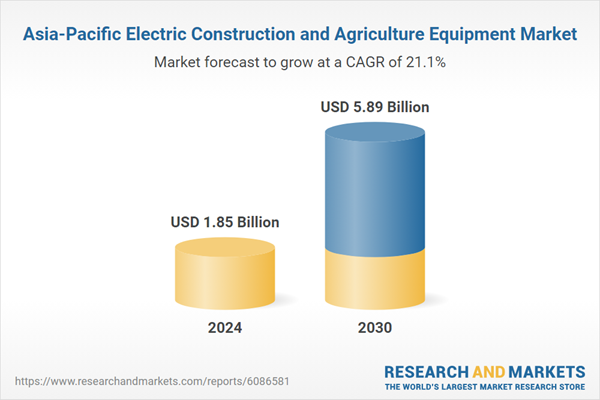Speak directly to the analyst to clarify any post sales queries you may have.
10% Free customizationThis report comes with 10% free customization, enabling you to add data that meets your specific business needs.
This is propelling the adoption of electric machinery in both the construction and agriculture sectors. Electric equipment offers numerous advantages, including reduced emissions, lower operating costs, and enhanced operational efficiency, making it an increasingly preferred choice. In agriculture, the shift toward mechanization and sustainable practices is boosting the use of electric-powered tractors, harvesters, and irrigation systems. Coupled with ongoing advancements in battery technology, telematics, and automation, the market is poised for transformative growth across diverse applications.
Key Market Drivers
Government Policies and Electrification Mandates
Government-led initiatives to reduce carbon emissions and promote sustainable industrial practices are a major driver for electric construction and agricultural equipment in the Asia-Pacific region. National and regional policies supporting electrification - through low-emission zone regulations, equipment subsidies, and tax incentives - are accelerating the transition away from diesel-powered machinery. In the agricultural sector, various subsidy programs are making electric equipment more accessible to smallholder and mid-size farmers. For instance, in India, over half of agricultural machinery purchases have been influenced by such incentives in recent years, with a growing percentage of tenders specifying electric models. These government-backed measures are encouraging manufacturers to expand their electric product lines and contributing to rapid market growth across multiple countries.Key Market Challenges
High Initial Investment and Limited Financing Options
One of the primary challenges for market adoption is the high upfront cost of electric construction and agricultural machinery. Components such as lithium-ion batteries and advanced control systems significantly elevate initial purchase prices compared to conventional diesel models. For small-scale farmers and contractors in developing economies, these costs are often prohibitive. Compounding this issue is the limited availability of financing options, as financial institutions remain cautious about loaning for electric equipment due to uncertainties in residual value and market maturity. This financing gap hampers widespread adoption, particularly among cost-sensitive users, despite the longer-term benefits of lower operating and maintenance expenses.Key Market Trends
Expansion of Charging Infrastructure
The rapid development of charging infrastructure is a notable trend shaping the Asia-Pacific electric construction and agriculture equipment market. Both public and private sector investments are being directed toward building accessible and efficient charging networks, including mobile charging units and renewable-powered stations. These developments are reducing downtime, enhancing productivity, and making electric machinery more practical for continuous and remote operations. As charging solutions become more widespread and user-friendly, adoption rates of electric equipment are expected to rise significantly, accelerating the overall market expansion.Key Players Profiled in this Asia-Pacific Electric Construction and Agriculture Equipment Market Report
- Caterpillar Inc.
- Komatsu Ltd.
- Volvo Construction Equipment
- John Deere
- CNH Industrial
- JCB
- Hitachi Construction Machinery
- Sonalika Tractors
- Escorts Kubota Limited
- Yanmar Holdings Co., Ltd.
Report Scope:
In this report, the Asia-Pacific Electric Construction and Agriculture Equipment Market has been segmented into the following categories, in addition to the industry trends which have also been detailed below:Asia-Pacific Electric Construction and Agriculture Equipment Market, by Equipment Type:
- Construction Equipment
- Agriculture Equipment
Asia-Pacific Electric Construction and Agriculture Equipment Market, by Power Source:
- Battery Electric
- Plug-in Hybrid Electric
- Fuel Cell Electric
Asia-Pacific Electric Construction and Agriculture Equipment Market, by Application:
- Residential Construction
- Commercial Construction
- Industrial Construction
- Infrastructure
- Crop Cultivation
- Harvesting
- Livestock Farming
- Others
Asia-Pacific Electric Construction and Agriculture Equipment Market, by Country:
- China
- Japan
- India
- South Korea
- Australia
- Singapore
- Thailand
- Malaysia
Competitive Landscape
Company Profiles: Detailed analysis of the major companies present in the Asia-Pacific Electric Construction and Agriculture Equipment Market.Available Customizations:
With the given market data, the publisher offers customizations according to a company's specific needs. The following customization options are available for the report.Company Information
- Detailed analysis and profiling of additional market players (up to five).
This product will be delivered within 1-3 business days.
Table of Contents
Companies Mentioned
The leading companies profiled in this Asia-Pacific Electric Construction and Agriculture Equipment market report include:- Caterpillar Inc.
- Komatsu Ltd.
- Volvo Construction Equipment
- John Deere
- CNH Industrial
- JCB
- Hitachi Construction Machinery
- Sonalika Tractors
- Escorts Kubota Limited
- Yanmar Holdings Co., Ltd.
Table Information
| Report Attribute | Details |
|---|---|
| No. of Pages | 120 |
| Published | May 2025 |
| Forecast Period | 2024 - 2030 |
| Estimated Market Value ( USD | $ 1.85 Billion |
| Forecasted Market Value ( USD | $ 5.89 Billion |
| Compound Annual Growth Rate | 21.1% |
| Regions Covered | Asia Pacific |
| No. of Companies Mentioned | 10 |









